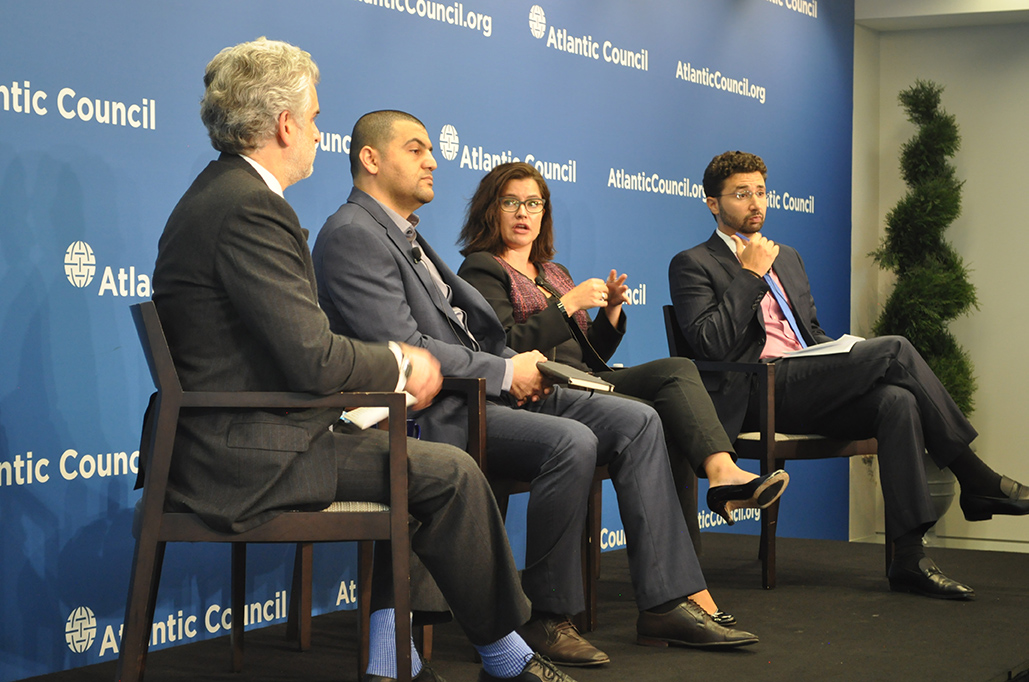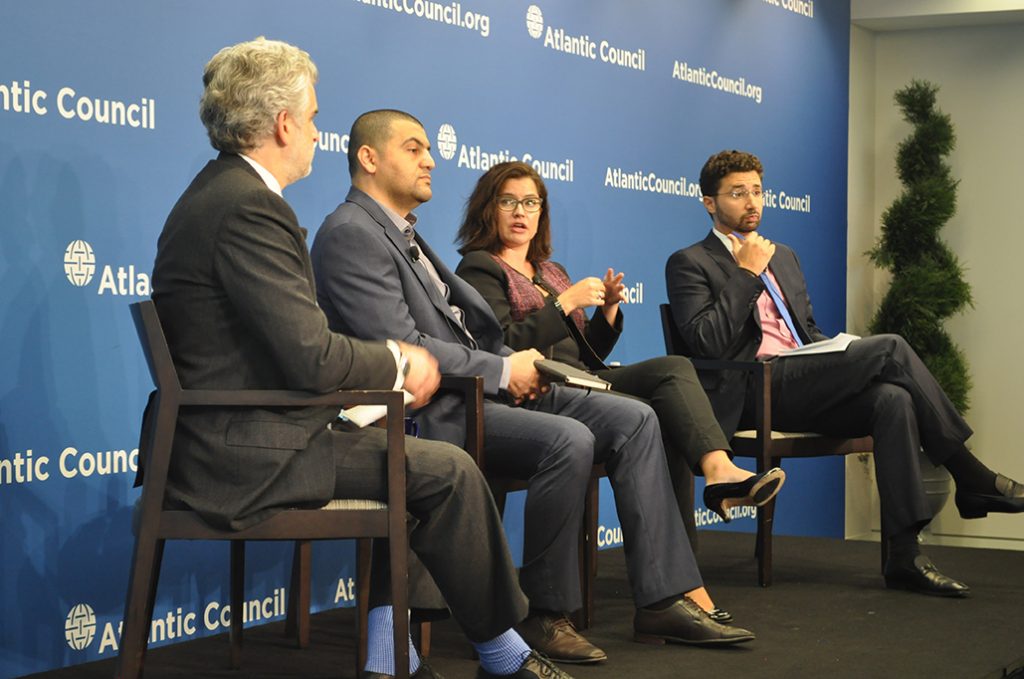 As Islamist groups continue to gain ground and Russia and Iran become involved in the Syrian conflict, it’s time for the United States to rethink its strategy to counter the Islamic State of Iraq and al-Sham (ISIS), a panel of experts at the Atlantic Council agreed on Oct. 15.
As Islamist groups continue to gain ground and Russia and Iran become involved in the Syrian conflict, it’s time for the United States to rethink its strategy to counter the Islamic State of Iraq and al-Sham (ISIS), a panel of experts at the Atlantic Council agreed on Oct. 15.
Bilal Y. Saab, Resident Senior Fellow for Middle East Security at the Atlantic Council’s Brent Scowcroft Center on International Security; Hassan Hassan, Associate Fellow at Chatham House; and Erin Simpson, Chief Executive Officer at Caerus Associates, were on the panel that was moderated by Barry Pavel, Vice President, Arnold Kanter Chair, and Director of the Scowcroft Center. The panelists discussed “The Future of the Coalition’s Anti-ISIS Strategy.”
The takeaway: The panelists agreed that the US’ strategy on ISIS needs a radical makeover, but exactly how—and when—was a topic of intense debate.
“You can forget about peace, or any solution sets in that country,” said Saab, “if we continue to fail to build a credible, strong opposition force on the ground that will be capable of defeating, or at least taking on effectively, ISIS and regime forces.”
The Obama administration acknowledged the failure of its $500-million effort to train Syrian rebels on Oct. 9. Ammunition and equipment given to US-trained rebels fell into the hands of Syrian al Qaeda affiliate Nusra Front, the Pentagon reported in September.
The facts are that ISIS, despite international efforts, remains well funded with oil money and powered by broad local support. The solution could lie in firmly confronting one of the greatest factors undermining security in the area—the Syrian refugee crisis, the largest since World War II.
A more robust response to the refugee crisis “would at least alleviate some of those pressures,” Simpson said, “not just on our NATO allies, but provide some space to let this other great game, peace, weigh out a bit longer.”
Saab quickly challenged that.
“I think that’s a disastrous approach,” he said, “I don’t want to test the proposition that the Russians might actually succeed, and that solidifies the perception that we don’t have any resolve in the Middle East.”
Still, with just over a year and a half remaining of the Obama presidency, Saab wasn’t optimistic US policy would change until a new administration is sworn in. Until then, he said, the best course of action is to prepare a new plan to put on the next President’s table.
“I don’t think we’re going to see any major changes in the current approach,” Saab said. “The right thing to do—once again, less likely—is to achieve a set of first downs to ideally get the next President to the Red zone.”
The changing face of ISIS
Much of ISIS’ manpower can be pinned to foreign fighters travelling en masse to join the extremist cause in Syria and Iraq. But that demographic is likely to change in the near future, said Hassan.
Though ISIS has always enjoyed a sense of local support in much of the land it occupies, the group could soon see its numbers boosted by Syrians and Iraqis joining not because they want to embrace Islamism, but out of sheer desperation, said Hassan.
“Airstrikes have disrupted a wartime economy that was functioning before ISIS,” Hassan said. Because airstrikes have destroyed that economy, people are left with no other choice.
“I notice that families do either of two things: the first one is either get their sons to join ISIS, or send their sons overseas to Europe as refugees,” Hassan added. “So, either join the refugee army, or [the] ISIS army.”
Hassan firmly believes ISIS is in for the long haul.
“I have no doubt that ISIS will stay at least for a decade, not only as a group that exists somewhere, but as a group that controls terrain [which will] probably be wider in the region.”
Russia and Iran’s role
Russia’s involvement in the Syrian conflict has added another level of complexity to an already chaotic landscape. Iran, too, is sending forces to reinforce Syrian President Bashar al-Assad’s ground operations.
In the end, it’s all to ISIS’ benefit, according to Hassan.
“The idea that the civil war would end would cause ISIS to worry,” Hassan said, adding that ISIS has fed off chaos in the region and wouldn’t hesitate to go to whatever lengths to ensure that environment remains—even if it means poking the Russian bear.
“The fact of the matter is that ISIS would not hesitate to provoke the Russians to get them more involved,” Hassan said. “I have no doubt that ISIS would do it, because even if it cost them Raqqa or another city, it would be a symbolic thing for all people who share that mindset.”
On Russian support for Assad, Saab and Hassan agreed Russia was unlikely to give up on the embattled Syrian President any time soon—if not out of a favoritism for Assad himself, but out of an interest in seeing the current regime stay.
“[Russia] views stability through the prism of a ‘strong man,’” Saab said. “I think that until there’s a clear alternative, another ‘strong man’ in Syria, they will hang on dearly to Assad.”
“I think it’s very hard to imagine that Assad will go and the regime will stay together,” Hassan added. “There’s a lot of tension. Assad is not just a President; he is a symbol of the old order. If he goes, it’s hard to keep these people together.”
Alejandro Alvarez is an intern at the Atlantic Council.
Image: From left: Barry Pavel, Vice President, Arnold Kanter Chair, and Director of the Atlantic Council’s Brent Scowcroft Center on International Security moderates a panel on “The Future of the Coalition’s Anti-ISIS Strategy” with Hassan Hassan, Associate Fellow at Chatham House; Erin Simpson, Chief Executive Officer at Caerus Associates; and Bilal Y. Saab, Resident Senior Fellow for Middle East Security in the Scowcroft Center, at the Atlantic Council in Washington on Oct. 15.
